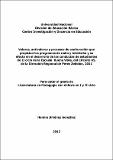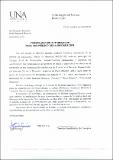| dc.contributor.advisor | Solano Rojas, Sergio | |
| dc.contributor.author | Jiménez González, Hannia | |
| dc.date.accessioned | 2020-09-15T21:43:42Z | |
| dc.date.available | 2020-09-15T21:43:42Z | |
| dc.date.issued | 2012 | |
| dc.identifier.uri | http://hdl.handle.net/11056/18170 | |
| dc.description | Para optar el grado de Licenciatura en Pedagogía con énfasis en I y II ciclo. | es_ES |
| dc.description.abstract | La presente investigación es de enfoque cuantitativo y se caracteriza por ser de
tipo descriptiva explicativa. Por lo que se detallan los fenómenos de una población
con el fin obtener conclusiones, sin hacer manipulaciones de variables. Para la
recopilación de la información, se elaboró un instrumento para estudiantes, padres
de familia y docentes.
Los principales resultados que se determinan son: la radio y la televisión influyen
en los valores, antivalores, aculturación y en conductas desarrolladas por los
estudiantes. La mayoría de los temas que presentan son de antivalores y estos
influyen en cierta forma en los estudiantes, demostrando actitudes de violencia en
los juegos que realizan con sus compañeros.
En cuanto a la aculturación, se puede concluir que los padres de familia
promueven en sus hijos una identidad propia, y buscan que sus hijos no se dejen
influenciar por los estereotipos presentes en los medios de comunicación.
Las Recomendaciones que se sugieren a estudiantes son: observar programas de
televisión que muestren temas de convivencia y buenas costumbres, que fomenten
los valores en el diario vivir para que de esta forma se logre sanas relaciones
sociales.
Se debe crear en los hijos su propia identidad, que no se basen en las formas de
actuar, vestir y hablar de otras culturas. Además, se deben regular los programas
que escuchan y observan sus hijos, a ser críticos por sí solos, de los mensajes
positivos y negativos que estos pretender dar a conocer en su programación.
A los docentes: promover en los estudiantes valores adaptativos y funcionales
para el desarrollo en la sociedad, para así, ser aceptados y capaces de salir
adelante con una adecuada interacción con el marco axiológico prevaleciente. | es_ES |
| dc.description.abstract | This research is quantitative in focus and is characterized by
descriptive explanatory type. Therefore, the phenomena of a population are detailed
with the purpose of obtaining conclusions, without making manipulations of variables. For the
information collection, a tool was developed for students, parents
family and teachers.
The main results determined are: radio and television influence
in the values, anti-values, acculturation and behaviors developed by the
students. Most of the topics they present are about anti-values and these
influence students in some way, demonstrating violent attitudes in
the games they play with their peers.
As far as acculturation is concerned, we can conclude that parents
promote in their children an identity of their own, and seek to ensure that their children do not
influence by the stereotypes present in the media.
The Recommendations suggested to students are: observe programs of
television that show topics of coexistence and good habits, that encourage
values in daily life so that healthy relationships are achieved
social.
Children must be given their own identity, not based on the forms of
acting, dressing and talking about other cultures. In addition, programs should be regulated
who listen and observe their children, to be critical on their own, of the messages
positive and negative that they intend to make known in their programming.
To the teachers: to promote in the students adaptive and functional values
development in society, so that they are accepted and able to leave
forward with an adequate interaction with the prevailing axiological framework. | es_ES |
| dc.description.sponsorship | Universidad Nacional, Costa Rica | es_ES |
| dc.language.iso | spa | es_ES |
| dc.publisher | Universidad Nacional, Costa Rica | es_ES |
| dc.rights | Acceso abierto | es_ES |
| dc.rights.uri | http://creativecommons.org/licenses/by-nc-nd/4.0/ | * |
| dc.subject | RADIO | es_ES |
| dc.subject | SISTEMAS DE TELEVISION | es_ES |
| dc.subject | ADICCION | es_ES |
| dc.subject | INFLUENCIA SOCIAL | es_ES |
| dc.subject | ACULTURACION | es_ES |
| dc.subject | ENSEÑANZA PRIMARIA | es_ES |
| dc.subject | VALORES SOCIALES | es_ES |
| dc.subject | NIÑOS | es_ES |
| dc.subject | AGRESIVIDAD | es_ES |
| dc.subject | TELEVISION SYSTEMS | es_ES |
| dc.subject | ADDITION | es_ES |
| dc.subject | SOCIAL INFLUENCE | es_ES |
| dc.subject | ACCULTURATION | es_ES |
| dc.subject | PRIMARY EDUCATION | es_ES |
| dc.subject | SOCIAL VALUES | es_ES |
| dc.subject | CHILDREN | es_ES |
| dc.subject | AGGRESSIVITY | es_ES |
| dc.title | Valores, antivalores y procesos de aculturación que propician los programas de radio y televisión y su efecto en el desarrollo de las conductas de estudiantes de II ciclo de la Escuela Buena Vista, del circuito 05, de la dirección regional de Pérez Zeledón, 2011 | es_ES |
| dc.type | http://purl.org/coar/resource_type/c_7a1f | es_ES |
| una.tesis.numero | 6937 | es_ES |
| dc.description.procedence | Sede Regional Brunca, Campus Pérez Zeledón | es_ES |



